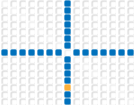Gorkij, Maxim oldala, Angol életrajz
Életrajz
Maxim Gorky (Aleksei Maksimovich Peshkov, March 28 ( O.S. March 16) 1868–June 14, 1936), better known as Maxim Gorky (Максим Горький), was a Soviet/Russian author, a founder of the socialist realism literary method and a political activist. He was born in the city of Nizhny Novgorod and died in Moscow. From 1906 to 1913 and from 1921 to 1929 he lived abroad, mostly in Capri; after his return to the Soviet Union he accepted the cultural policies of the time, although he was not permitted to leave the country.
Gorky became an orphan at the age of nine and was brought up by his grandmother, an excellent storyteller. Her death deeply affected him, and after an attempt at suicide in December 1887, he travelled on foot across the Russian Empire for five years, changing jobs and accumulating impressions used later in his writing.
As a journalist working in provincial newspapers, he wrote under pseudonym Иегудиил Хламида (Jehudiel Khlamida). He began using pseudonym Gorky (literally "bitter") in 1892, while working in Tiflis newspaper Кавказ (The Caucasus). Gorky's first book Очерки и рассказы (Essays and Stories) in 1898 enjoyed a sensational success and his career as a famous writer set off.
He publicly opposed the Tsarist regime and was arrested numerous times. Gorky befriended many professional revolutionaries he encountered and became Lenin's personal friend after they met in 1902. He exposed governmental control of the press (see Matvei Golovinski affair). In 1902, Gorky was elected the honorary Academician of Literature, but Nicholas II ordered to annul this election. In protest, Anton Chekhov and Vladimir Korolenko left the Academy.
While briefly imprisoned in Peter and Paul Fortress during the abortive Russian Revolution of 1905, Gorky wrote the play Children of the Sun, nominally set during an 1862 cholera epidemic, but universally understood to relate to present-day events. In 1905 he officially joined the ranks of the Bolshevik faction in the Russian Social Democratic Labor Party.
During World War I, his apartment in Petrograd was turned into a Bolshevik staff room, but his relations with the Communists turned sour. Two weeks after the October Revolution of 1917 he wrote: "Lenin and Trotsky don't have any idea about freedom or human rights. They are already corrupted by dirty poison of the power, this is visible by their shameful disrespect of freedom of speech and all other civil liberties for which the democracy was fighting." Lenin's 1919 letters to Gorky contain threats: "My advice to you: change your surroundings, your views, your actions, otherwise life may turn away from you."
In August 1921, Nikolai Gumilyov, his friend, fellow writer and Anna Akhmatova's husband, was arrested by Petrograd Cheka for his monarchist views. Gorky hurried to Moscow, attained the order to release Gumilyov from Lenin personally, but upon his return to Petrograd he found out that Gumilyov has already been shot. In October Gorky emigrated to Italy on bad health grounds: he had tuberculosis.
According to Aleksandr Solzhenitsyn, Gorky's return was motivated by the material interests. In Sorrento Gorky found himself without money and without glory. He visited the USSR several times after 1929, and in 1932 Joseph Stalin personally invited him to return from the emigration for good, an offer he accepted. In June, 1929 Gorky visited Solovki (cleaned up for this occasion) and wrote a positive article about the Gulag camp that already gained ill fame in the West.
Gorky's return from fascist Italy was a major propaganda victory for the Soviets. He was decorated by the Order of Lenin and given a mansion (formerly belonged to millionaire Ryabushinsky, currently Gorky Museum) in Moscow and a dacha in the suburbs. One of the central Moscow streets, Tverskaya, was renamed in his honor, as well as the city of his birth. The largest airplane in the world in the mid-1930s, the Tupolev ANT-20 (photo), was also named Maxim Gorky. It was used for propaganda purposes and often demonstratively flew over the Soviet capital.
In 1933 Gorky edited an infamous book about the Belomorkanal, presented as an example of "successful rehabilitation of the former enemies of proletariat."
With the step-up of Stalinist repressions and especially after the death of Sergei Kirov in December 1934, Gorky was placed under unannounced house arrest in his Moscow house. He was supplied daily with a special edition of the newspaper Pravda containing no news about arrests or purges.
The sudden death of his son Maxim Peshkov in May 1935 was followed by the death of Maxim Gorky in June 1936. Both died under suspicious circumstances, but speculations that they were poisoned have never been proven. Stalin and Molotov were among those who hand-carried Gorky's coffin during the funerals.
During the Bukharin trials in 1938, one of the charges brought up was that Gorky was killed by Yagoda's NKVD agents.
Gorky's city of birth was renamed back into Nizhny Novgorod in 1990.
source: wikipedia.org



